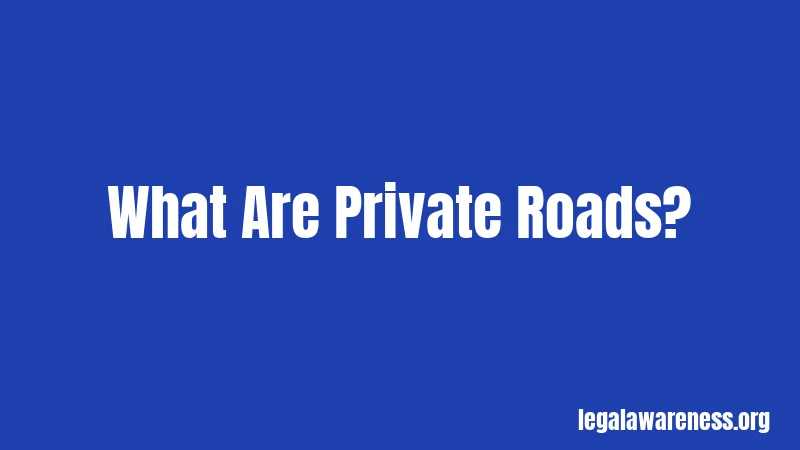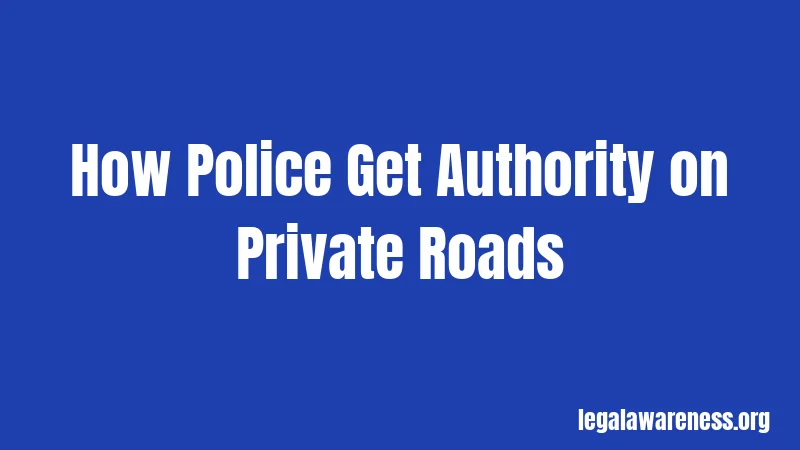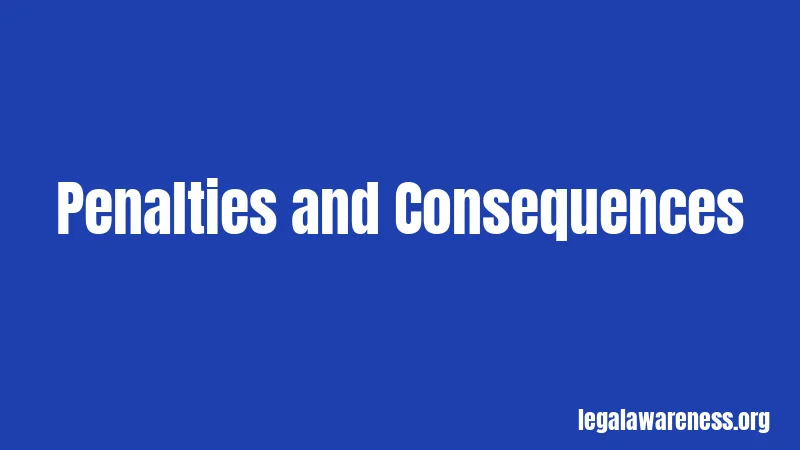Private Road Laws in Florida (2026): What You Need to Know
Private roads are common in Florida’s gated communities and neighborhoods. Understanding the laws that govern these roads is important for property owners, homeowners associations, and drivers. This guide explains your rights and responsibilities when it comes to private roads in the Sunshine State.
Whether you live in a community with private roads or just drive on them occasionally, these laws affect you. Recent changes in 2024 and 2025 have updated how these roads work with local law enforcement and what homeowners associations can do.
What Are Private Roads?

Private roads are streets owned by individuals, homeowners associations, or private companies. Unlike public roads, the government does not build or maintain them. Private roads serve homes, businesses, or developments where the public may or may not have access.
These roads exist in many Florida communities. You’ll find them in gated neighborhoods, private developments, and mobile home parks. The key difference is ownership – someone other than the government owns and controls the road.
Basic Private Road Laws
Who Controls Private Roads
The owner of a private road makes the rules for that road. This could be a single person, a homeowners association, or a private company. Road owners decide who can use the road and what rules apply.
Private road owners must maintain their roads. This includes fixing potholes, managing drainage, and keeping the road safe for users. If someone gets hurt because of poor road maintenance, the owner could face a lawsuit.
Police Enforcement on Private Roads
Police cannot automatically enforce traffic laws on private roads. However, Florida law allows road owners to request police enforcement. This requires a written agreement between the road owner and local government.
Under Florida Statute 316.006, homeowners associations can vote to have state traffic laws enforced on their private roads. The HOA board needs a majority vote to make this happen. Once approved, local police can issue tickets and make arrests on those private roads.
How Police Get Authority on Private Roads

Written Agreements Required
Counties and cities can enforce traffic laws on private roads only with proper agreements. The road owner and local government must sign a written contract. This agreement gets approved by the county commission or city council.
The private road owner usually pays for enforcement costs. They also provide liability insurance to protect the government. These agreements can include other terms that both sides agree to.
HOA Voting Process
Homeowners associations have special powers under Florida law. The HOA board can vote to allow police enforcement on community roads. This vote must happen during a proper board meeting with majority approval.
Once the HOA votes yes, they contact local law enforcement to set up enforcement. The process includes working out payment arrangements and insurance requirements. Police can then patrol private roads just like public streets.
Private Road Speed Limits and Signs
Setting Speed Limits
Road owners can set speed limits on their private roads. However, if police will enforce these limits, the signs must meet state standards. Florida requires speed limit signs to follow Department of Transportation specifications.
Most private roads have speed limits between 20 and 30 mph. Gated communities often use 25 mph as their standard speed. Lower speeds help protect pedestrians, children, and cyclists in residential areas.
Stop Signs and Traffic Control
Private road owners can install stop signs and other traffic controls. If police will enforce these signs, they must meet state requirements. The signs must be the right size, color, and placement to be legally enforceable.
Traffic control devices help keep private roads safe. However, owners must follow proper installation guidelines. Poorly placed or non-standard signs may not hold up in court if challenged.
Penalties and Consequences

Speeding Tickets on Private Roads
If a private road has police enforcement agreements, speeding tickets work the same as public roads. Fines start around $25 for minor violations and increase based on how fast you were going.
For speed violations of 1-5 mph over the limit, drivers typically get warnings. Going 6-9 mph over costs around $129. Speeds of 10-14 mph over the limit result in fines around $204. Higher speeds bring steeper penalties.
Other Traffic Violations
Police can enforce all traffic laws on private roads with proper agreements. This includes reckless driving, DUI, running stop signs, and other violations. Penalties match those for public road violations.
The 2024 Florida law changes made some speeding penalties much harsher. Driving 50 mph or more over any speed limit can now result in jail time. First offense brings up to 30 days in jail and a $500 fine.
Special Circumstances
Gated Communities
Gated communities have unique considerations for private roads. Security gates control access, but emergency vehicles must always have entry. HOAs cannot restrict first responders from using community roads.
The 2024 HOA law changes protect homeowners’ parking rights. HOAs cannot prohibit residents from parking personal vehicles, including pickup trucks, in their driveways. First responders can also park their work vehicles on public roads within the community.
Mobile Home Parks
Mobile home parks often have private roads serving the community. Florida law specifically allows police enforcement in these areas under certain conditions. The municipality must have jurisdiction and proper agreements in place.
These parks frequently use private roads for internal circulation. The park management typically owns the roads and sets usage rules. However, emergency access must always be maintained for safety vehicles.
Business Access Roads
Some private roads provide access to businesses or shopping centers. If these roads are open to the public, different rules may apply. Courts look at how the road functions rather than just who owns it.
Business access roads that serve the general public may face additional requirements. Local governments often require these roads to meet certain safety and maintenance standards as a condition of business permits.
How to Get Police Enforcement on Your Private Road
For Homeowners Associations
HOA boards can request police enforcement through a majority vote. The board must pass a resolution authorizing the request. They then contact the local sheriff’s office or police department to begin negotiations.
The HOA needs to provide liability insurance coverage. Most agreements require the HOA to pay enforcement costs. This includes officer time, vehicle expenses, and administrative costs. Insurance protects both parties from accident liability.
Required Documentation
Enforcement agreements require specific documentation. The HOA must provide proof of road ownership. They need current insurance policies and financial ability to pay costs. Legal documents must show the HOA has authority to make such agreements.
The local government reviews all documents before approval. They want to ensure the HOA can meet its obligations. The sheriff’s office also evaluates whether they have resources to provide enforcement services.
Insurance and Liability
Private road enforcement agreements require comprehensive insurance. The road owner must protect the local government from lawsuits. This insurance covers accidents, injuries, and other incidents during enforcement activities.
Liability insurance typically costs several thousand dollars annually. The exact amount depends on road length, traffic volume, and coverage limits. Some HOAs share these costs through special assessments on homeowners.
Homeowner Rights and Responsibilities
Recent 2024 Law Changes
Florida’s 2024 HOA law changes strengthened homeowner rights regarding private roads. HOAs cannot restrict parking of personal vehicles in driveways. This includes pickup trucks and work vehicles that aren’t commercial motor vehicles.
The new laws also protect first responders’ parking rights. Police officers, firefighters, and paramedics can park their assigned vehicles on public roads within HOA communities. Associations cannot enforce parking restrictions against these essential workers.
Maintenance Responsibilities
Homeowners typically share private road maintenance costs through HOA fees or special assessments. The HOA board manages road repairs, repaving, and other improvements. Individual homeowners cannot usually opt out of these shared expenses.
Property owners benefit from well-maintained private roads through higher property values. However, they also bear the full cost of maintenance without government assistance. This includes major repairs that can cost thousands of dollars per household.
Access Rights
Property owners have legal rights to access their homes via private roads. HOAs cannot completely block access to any property owner in good standing. However, they can restrict certain types of vehicles or activities on community roads.
Guest access rights depend on HOA rules and community documents. Most associations allow reasonable guest access but may restrict commercial vehicles or overnight parking. Emergency vehicles always have access rights regardless of HOA rules.
Private Road Maintenance and Liability
Owner Responsibility
Private road owners must keep their roads in safe condition. This includes regular maintenance like filling potholes, clearing drainage, and trimming vegetation. Neglecting maintenance can lead to serious legal liability.
If someone gets injured due to poor road conditions, the owner may face a premises liability lawsuit. Florida law requires property owners to maintain safe conditions for people who have permission to use their property. This duty extends to private roads.
Insurance Requirements
Most private road owners carry liability insurance to protect against accident claims. This insurance covers injuries, property damage, and legal defense costs. HOAs should ensure their insurance specifically covers road liability.
Insurance companies may require regular road inspections and maintenance schedules. They want to verify that owners are properly maintaining their roads. Some insurers offer discounts for communities with good maintenance records.
Emergency Vehicle Access
Florida law requires private roads to provide emergency vehicle access. This means roads must be wide enough and strong enough for fire trucks and ambulances. Road surfaces must support heavy emergency vehicles at all times.
HOAs cannot restrict emergency vehicle access even during non-emergency situations. Emergency responders need to know road conditions and access points before actual emergencies occur. Regular access helps ensure effective emergency response when needed.
Frequently Asked Questions
Can police give tickets on private roads?
Yes, but only if the road owner has a written agreement with local government for police enforcement. Without such an agreement, police cannot enforce traffic laws on private property.
Who pays for private road maintenance?
The road owner pays for maintenance. In HOA communities, all homeowners typically share these costs through association fees or special assessments.
Can HOAs restrict what vehicles I park in my driveway?
No, under 2024 Florida law changes, HOAs cannot restrict personal vehicles, pickup trucks, or non-commercial work vehicles from parking in homeowner driveways.
What happens if I get hurt on a poorly maintained private road?
You may be able to sue the road owner for premises liability. Florida law requires property owners to maintain safe conditions for people using their property.
Can emergency vehicles always access private roads?
Yes, Florida law requires private roads to provide emergency vehicle access at all times. HOAs cannot restrict emergency responders from using community roads.
Final Thoughts
Private road laws in Florida balance property owner rights with public safety needs. Understanding these laws helps protect your interests whether you own property in a private road community or just drive on these roads.
The 2024 and 2025 law changes strengthened homeowner rights while maintaining safety requirements. HOAs have less power to restrict homeowners but still maintain responsibility for road safety and maintenance.
If you have questions about private road laws affecting your property, consider consulting with a Florida real estate attorney. These laws can be complex, and professional advice ensures you understand your rights and obligations.
